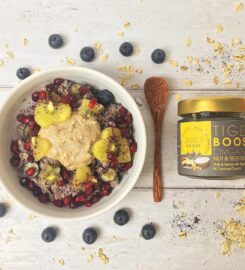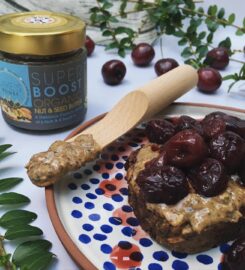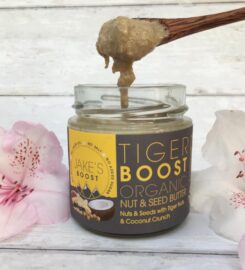Jake’s Boost
Stoneground - No added sugar or salt - No Palm Oil - Vegan & Gluten Free
Vegan Nut Butter
Our Organic Boost Vegan Nut & Seed Butters (TM) are made from only the best of certified Organic ingredients. Stone ground with no added sugar, salt or oil. They are all Vegan and gluten free. Available in recycled/recyclable glass jars with biodegradable paper free labels. The perfect snack on the go, at your desk or whenever you need a little pick-me-up without the usual rubbish.
We offer 4 very different nut & seed butters combinations, with more in development & many more products planned to follow… And 5% of our profits go to charity!
Our Boosters
The stars of our yummy products are of course the Organic ingredients. Nuts and seeds are real powerhouses when it comes to nutrition. They can contain heaps of protein, essential fats, dietary fibre and micronutrients essential for a healthy and happy life. And to top it all off hey taste great. Listed below are just a few of the many amazing things these health boosting ingredients can do for you:
Vegan Nut & Seed Butters
Cashews are said to be a great source of minerals, containing up to 31%* of the daily recommended value for copper, up to 23%* for manganese, 20%* for magnesium and 17%* for phosphorus, add that to approximately 12% of the daily recommended value of vitamin K. Magnesium apparently can also help to diminish the frequency of migraines, improve cognitive ability and lowers blood pressure. Copper may help to protect against heart disease and cancer. Magnesium is said to work with copper to help provide bone strength, with melanin and elastin to help provide joint flexibility, giving the nerves the right tension.
Almonds are know to contain high levels of healthy unsaturated fatty acids in addition to fibre, phytosterols, vitamins, other minerals, and antioxidants, which can help in the prevention of cardiovascular heart diseases. Also, almonds contain two very important fatty acids, both linoleic and linolenic acids. Those fatty acids can help to reduce inflammation all around the body. Manganese, copper and riboflavin in almonds also can help in energy production and metabolic rate
Brazil Nuts can be a good source of vitamin-E; they can contain up to 7.87* mg per 100 g (about 52%* of RDA). Vitamin-E is required for maintaining the integrity of cell membrane of mucusa and skin by helping to protect it from harmful oxygen-free radicals. These creamy nuts can also be an excellent source of B-complex group of vitamins such as thiamin (up to 51%* of RDA per 100 g), riboflavin, niacin, pantothenic acid, vitamin B-6 (pyridoxine), and folates. They can also hold good levels of other minerals such as copper, magnesium, manganese, potassium, calcium, iron, phosphorus, and zinc. Copper for example can help to prevent anemia and bone weakness
Walnuts, normally rich in monounsaturated fatty acids (around 72%*) like oleic acid, can also be an excellent source of all important omega-3 essential fatty acids like linoleic acid, alpha-linolenic acid (ALA) and arachidonic acids. Regular intake of walnuts in the diet can also help in the lowering of total as well as LDL or “bad cholesterol” and help to increase HDL or “good cholesterol” levels in the blood which can then help to lower the risk of coronary artery disease and strokes. It has recently been discovered that walnuts have one of the highest levels of popyphenolic antioxidants when compared to other common edible nuts.
Pecans are said to be packed with antioxidants – one of those is vitamin E, which scientists say may convey neurological and cell protection. Betacarotenes, lutein, and zeaxanthin in pecans can also help your body to rid itself of harmful free radicals, which can help to protect it from some diseases, cancers and infections. They can also contain Manganese (up to 245%* of the daily value per serving), copper, magnesium (helping a healthier immune system, nerve function, heart rhythm, muscle and bone strength) and zinc (helping to improve immune function, protein synthesis, DNA synthesis, cell division, and wound healing). Plant sterols in pecans can offer further cholesterol-lowering ability.
Hazelnuts can be a rich source of numerous essential nutrients. Typically high in protein, dietary fibre, vitamin E, thiamin, phosphorus, manganese, and magnesium, all usually exceeding the 30%* of Daily Recommended Value, and also helping to reduce blood pressure and inflammation. Plus several B vitamins. Lesser in volume but still present (approximately 10-19%* DV) are vitamin K, calcium, zinc, and potassium. Hazelnuts can be a good source of total fat, accounting for up to 93%* DV in a 100-gram serving. The fat components are monounsaturated fat as oleic acid (up to 75%* of total) which has be proven to help reduce your risk of cardiovascular disease, polyunsaturated fat mainly as linoleic acid (up to 13%* of total) and saturated fat, mainly as palmitic acid and stearic acid (together, up to 7%* of total).
Sunflower Seeds are typically rich in poly-unsaturated fatty acid linoleic acid. Like nuts, they too can be a very good source of proteins loaded with fine quality amino acids such as tryptophan that are essential for growth, They can also be a very good sources of B-complex vitamins such as niacin, folic acid, thiamin (vitamin B1), pyridoxine (vitamin B6), pantothenic acid, and riboflavin. Calcium, iron, manganese, zinc, magnesium, selenium, and copper are normally especially concentrated in sunflower seeds. Many of these minerals can help to play a vital role in bone mineralization, red blood cell production, enzyme secretion, hormone production, as well as in the regulation of cardiac and skeletal muscle activities.
Flaxseeds, also know as linseeds, can be a rich source of micronutrients, dietary fibre, manganese, vitamin B1, and the essential fatty acid alpha-linolenic acid, also known as ALA or omega-3. They can also help to lower blood sugar levels, reduce bone loss and increase immunity.
Chia is filled with up to two times more protein than most grains and up to five times more calcium than milk, and almost no cholesterol. Plus, it can have high levels of omega-3 and omega-6 fatty acids, soluble fiber, potassium and antioxidants. With up to 27%* of the body’s daily value for phosphorus, chia seeds also help maintain healthy bones and teeth. Phosphorus is used by the body to help synthesize protein for cell and tissue growth and repair, essential after exercise.
Hemp is said to contain all 10 essential amino acids. It is normally high in fibre and rich in minerals such as iron, zinc, potassium and magnesium- which are beneficial for healthy bones and teeth and can help aid in proper muscle function, nervous system function and energy metabolism. Hemp is said to contain an almost ideal ratio of the essential fatty acids Omega 3,6 & 9.
Cocoa Nibs, from the cacao fruit bean, can be a rich source of antioxidants, vitamins, minerals and fibre. They can also be one of the better sources of magnesium, needed for more than 300 biochemical reactions in the body (up to 272* milligrams per 100 grams) important for muscle and nerve function and heart rhythm. Dietary fibre (1 ounce can have up to 9 grams) and iron, necessary for red blood cell production, can also found. 1 ounce of raw nibs can have up to 6%* of your recommended daily iron intake. Cacao’s ability to act on neurotransmitters is why it has be known for its mood-enhancing benefit. It can also help to stimulate the brain to release neurotransmitters that trigger emotions like euphoria. Phenylethylamine, an adrenal-related chemical our bodies make when excited makes us feel focused and alert can also be found. Anandamide, a lipid found in cacao, is also part of its feel-good factor. Theobromine, which makes between 1-2%* of the cacao bean, is a nervous system stimulant that helps dilate the blood vessels like caffeine does. You also get more calcium from pure cacao than chocolate because the sugars commonly found in chocolate takes calcium reserves from the body.
Peanuts are know as a good source of healthy fats, protein and fibre. They are usually high in Oleic Acid, a monounsaturated fatty acid, a good fat that can help to reduce bad cholesterol whilst boosting levels of good cholesterol. These monounsaturated fats can also found in seeds, olive oil and avocados. They also contain Resveratrol, said to be a powerful antioxidant often associated with increased brain blood flow and decreased risk of stroke. They are also said to be an excellent source of Biotin, technically considered part of vitamin B complex, sometimes called vitamin H, suggested to be beneficial for physiological well-being.
Tiger nuts are tubers that are free from soy, dairy, grain, nut, seed. Tiger nuts are believed to be one of the highest whole food sources of a unique type of fibre called resistant starch. Resistant starch is said to be a highly beneficial pre-biotic, which means it feeds the good bacteria in your digestive tract. Unlike other starchy vegetable tubers such as potatoes, tigernuts can be a better source of healthy fats. They have a fatty acid composition similar to olive oil, with the fat composition being about 73%* monounsaturated fat, around 18%* saturated fat and up to 9%* polyunsaturated fat.
Coconuts can be excellent for your immunity as they are said to be antiviral, anti-fungal, antibacterial, and anti-parasitic. They can also help to kill off some harmful bacteria, viruses, fungi, and parasites. It also has be said to help in the treatment of some resilient illnesses caused by microbials. Its can also be a good source of fibre, vitamins, minerals and amino acids.




